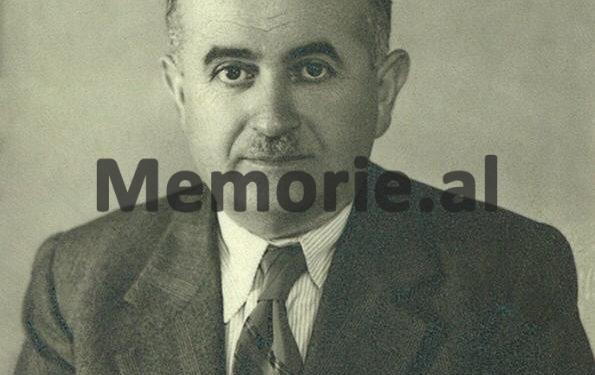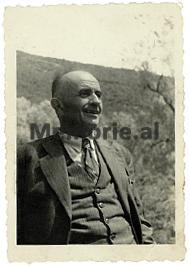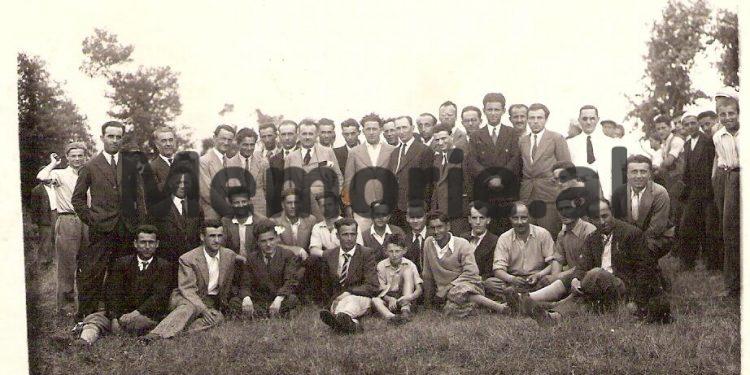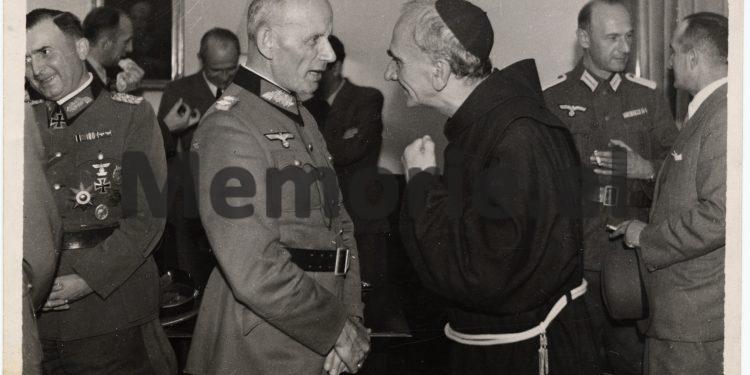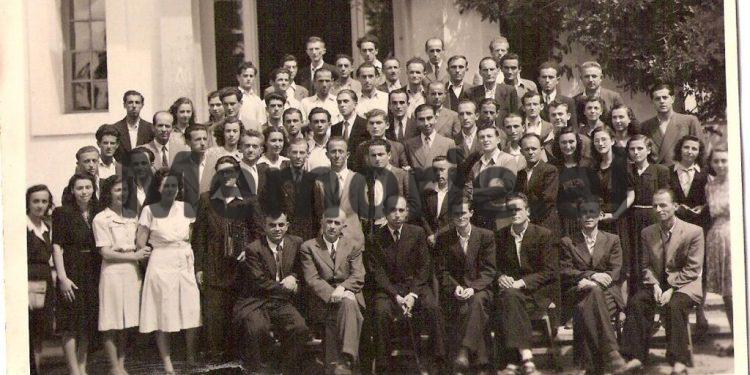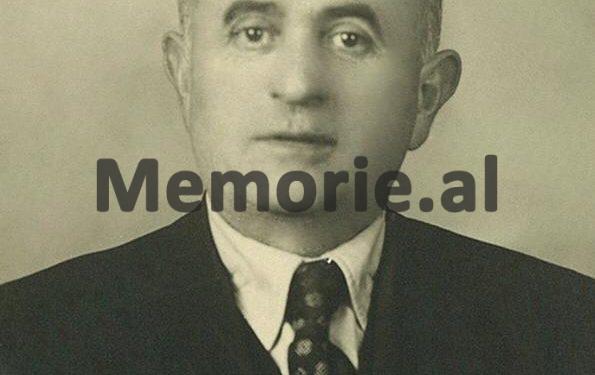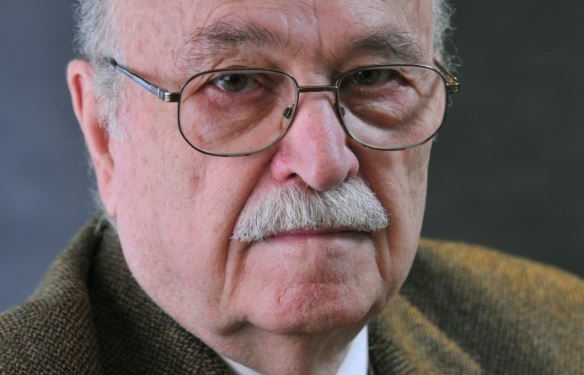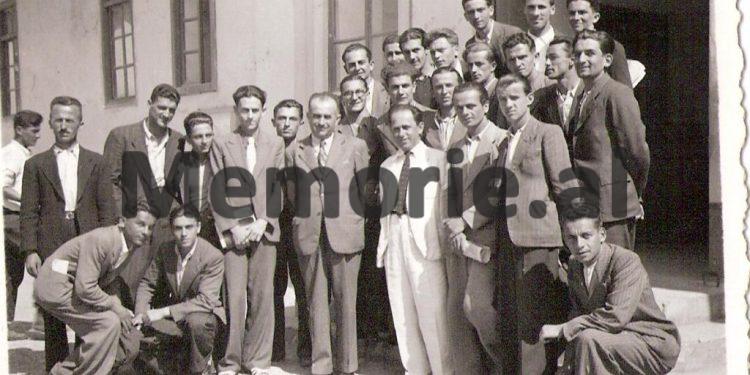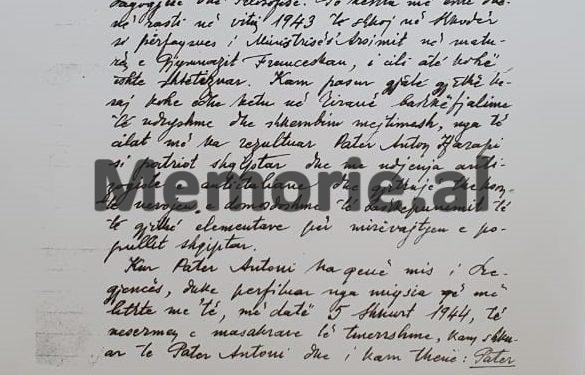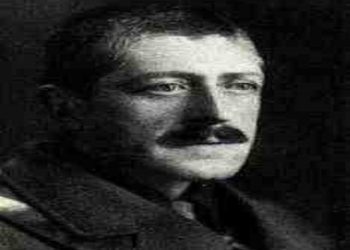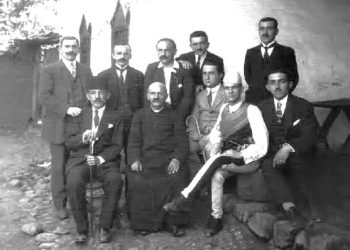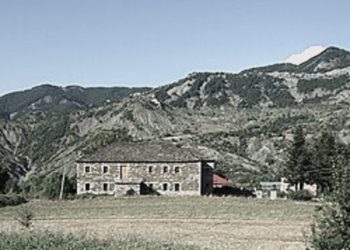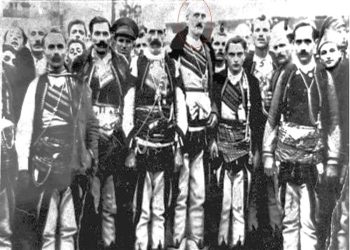Dashnor Kaloçi
Memorie.al publishes the unknown story of prof. Gabriel Meksi, who in 1946 when the “Regency Trial” was taking place he issued a statement to defense counsel, Dr. Spiro Stringa, defending his former friend, Father Anton Harapi, who together with the other regent Lef Nosi and the former Prime Minister, Maliq Bushati, were on the bench of the accused as “enemies of the people”. What was written in that statement and the whole unknown story of prof. Gabriel Meksit, originally from Labova e Madhe, Gjirokastra district, who after studying for a year in “Zosimea” of Ioannina and then a year in Egypt, finished his studies at the Normal Marasleion in Athens in 1911, and in 1925 was graduated from the University of Athens for “History-Geography”. He served for some time as a teacher and principal in several schools in the villages of Ioannina and later in the Israeli College of Preveza. Gabriel’s return to Albania in 1927 with his family and his long career as a professor in some of the most famous schools and gymnasiums of the country, where he served with rare devotion and dedication, so that he was among the only ones who held teachers even after 1944 when the communists came to power. The life and career of prof. Meksit in the memories of some of his colleagues and former students, such as: Mark Gurakuqi, Stavri Naçi, Marika Vogli, Drita Siliqi, Fedhon Meksi, Skifter Këlliçi etc.
“I have known Father Antoni since Shkodra in 1928-’30 when I served in the State Gymnasium there, and even more so when in July 1930, I went to Shkodra as a representative of the Ministry of Education in the Matura exams of the Normal of the Stigmatines, where Padre Antoni was as a professor of Philosophy and History. I was also given the opportunity to go to Shkodra in 1943 as a representative of the Ministry of Education of the Franciscan Gymnasium, which at that time was nationalized. During all this time and here in Tirana, I have had various conversations and exchanges of mourning, from which Father Anton Harapi has resulted, as an Albanian patriot with anti-Zogist and anti-Italian feelings, and I always emphasize the need for cooperation of all elements. for the well-being of the Albanian people ”. This was written, among other things, in a statement of Professor Gabriel Meksi dated February 6, 1946, issued to the well-known lawyer, Dr. Spiro Stringa, to use in the “Regency Court”, where he was defending his client, Father Anton Harapi, who was on the dock along with the other regent, Lef Nosi, and former Prime Minister Maliqë Bushati, of accused of being “traitors and enemies of the people.” But who was prof. Gabriel Meksi, what was the origin of his family, where did he study and graduate and how did he manage to serve as a professor since the period of the Zog Monarchy, it under the Italian-German occupation of the country and during the years of the communist regime? Regarding this and other events and facts from the life and career of the famous professor, we know the article that Memorie.al is publishing in this issue, which is based on documents provided to us by the family of the lawyer, Dr. Spiro Stringës, as well as some of the memories and testimonies of his colleagues and former students.
Statement of Professor Gabriel Mex in the trial of Father Anton Hara
D e c l a r a t i o n
I sign Gabriel Th. Meksi, professor at the Lyceum of Tirana, regarding the defendant Patër Anton Harapi, stated as follows:
I have known Father Antonin since Shkodra in 1928-’30 when I served in the State Gymnasium there, and even more so when in July 1930, I went to Shkodra as a representative of the Ministry of Education in the Matura exams of the Normal of Stigmatines, where Father Anthony was a professor of Philosophy and History.
I was also given the opportunity to go to Shkodra in 1943 as a representative of the Ministry of Education of the Franciscan Gymnasium, which at that time was nationalized. During all this time and here in Tirana, I have had various conversations and exchanges of mourning, from which Father Anton Harapi has resulted, as an Albanian patriot with anti-Zogist and anti-Italian feelings, and I always emphasize the need for cooperation of all elements. for the well-being of the Albanian people.
When Father Anthony was the Miss of the Regency, taking advantage of the friendship that bound me to him, on February 5, 1944, the day after the horrific massacre, I went to Father Anthony and said to him: “Father Anthony, what are these that are being done ?! “After that, you have no place to stay.” Ay, being heavy, replied: “Oh, my God, Meksi, if Lefi and I run away, your head will not be safe.”
At his request I issue this statement
Tirana, February 6, 1946 Declarant
Prof. Gabriel Th. Meksi
The word of defense of the lawyer Dr. Spiro Stringa in the trial against Father Anton Harapi, where he quotes during the statement of prof. Meksit in his defense.
Mr. Judges. It is not our conviction that Father Anton Harapi was anti-Italian, but it is confirmed by Mr. Prof. Gabriel Meksi, one of the valuable teachers who knows and weighs the evidence, and it can not be assumed that he trumpeted what Father Anton Harapi wanted. Mr. Meksi clearly states in his statement that: “During this time from 1928 to 1944, I had various conversations and exchanges of mourning with Father Anton Harapi, of which I resulted as an Albanian patriot and with anti-Italian sentiments, and always stressed the necessary need to unite all the elements, for the well-being of the Albanian people “. As I pointed out above, Judges, the best fact is that Father Anton Harapi has never made an anti-Albanian policy in favor of Italy, because the Italians would have speculated on this fact in every way by trumpeting it on the radio, through the press for their purposes, as they did for other events that interested them.
Here, on January 13, 1944, Father Anton Harapi is found as a Member of the Regency, at the head of the State. From the legal point of view, his activity starts from this date, because according to the positive Law, no employee can start from the performance of duty, before taking the oath. By this time the winter operation was almost over; therefore it should be considered that Father Anton Harapi is not responsible for giving the previous order for the operations.
Father Anton Harapi, Mr. Judges, is terrified of the fatal dates mentioned above, a fact that emerges from the statement issued by Mr. Professor Gabriel Meksi, who, among other things, mentions: “Father, what are these things you are saying, Lefi and I will run away, and your head is not safe”. Father Anton Harapi inadvertently entered a pond and turned around but could not. He demands, as much as possible, that degeneration not be increased, that the sufferings of anyone be reduced, that suffering be made easier, that the savage beasts of Nazism be softened, who, to be bloodied, did not know what to live and attack in a brutal way against the noble Albanian people. Father Anton Harapi, tries as much as he can, to be close to anyone; sheds sincere tears, and it is not a hypocritical conventionalism, but it is the great tragedy that develops in his soul, when he sees the miserable condition of the Albanians.
Who was prof. Gabriel Meksi?
Gabriel Meksi was born on September 13, 1894 in the village of Labova e Madhe in Gjirokastra. His father, Thoma Vangjel Meksi, first worked as a teacher in, among others, in Filat of Chameria, and later as the director of a Greek civic school, as well as a French teacher until Egypt (1908), where he went with his sons. After the Balkan Wars, Thoma Meksi returned and resumed his work, serving as a professor of French at the high schools of Ioannina and Preveza, until 1919, when he passed away.
Gabriel Meksi, after receiving his first lessons in his native village (Labova e Zhapa) and further in the city school of Gjirokastra, his family sent him to continue his studies at the famous gymnasium “Zosimea” of Ioannina, which at that time was one of the most popular and prestigious high schools in the entire Balkans. After graduating from that school with high results, he attended the “Normal” school of Marasleion in Athens, where after graduating with high results, in 1911-’13, he was appointed and worked as a teacher and principal in several schools in the villages of Ioannina, such as: Papingj, Arçisht and Krapsh.
Participated in several battles with the rank of captain
The Balkan Wars and the First World War took him to the age of military service and like all his fellow citizens, he was called up for arms, sometimes as an active soldier and sometimes as a reservist, to be sent to military schools. . When he was released from military service, he taught in the villages of Ioannina and Preveza. Being mobilized under arms, in 1918 he took part in the First World War on the Macedonian front, where he was honored with decorations by the victorious Allied forces, which later led him to be sent to Asia Minor. , in the Greco-Turkish war. This was the last war in which he participated as an effective under arms, as after the defeat of the Greek army, he was finally released from the army and returned to Athens with the rebel troops, (in October 1922), having the rank of captain.
Despite the many difficulties and vicissitudes full of tensions he went through during those years in those wars in which he participated, Gabriel Meksi had his mind only on teaching and continuing his studies in high schools. Thus he competed and won the right to continue his studies at the University of Athens, to complete his studies in the field of pedagogy and philosophy, earning with the merit and degree of professor of History and Geography. After graduation, he served for two years as a teacher in Preveza, but never took his mind off his hometown. At that time there were many young boys graduating from Greek schools who came to Tirana, as it became the capital of the country and among them were many of his fellow Labovites, such as. Vasil Dilo, who would later become a well-known lawyer and publicist in defense of patriotic feelings, against the annexationist intentions of the neighbors. After Dilos, other young boys returned, eager to serve their new homeland and rising state.
Return to Albania in 1927
One of them was Gabriel Meksi, who in the summer of 1927, he and his family finally returned to Albania. At that time the doors of schools were open and so the dream of teaching for the good of the homeland came true. According to the scholar Thoma Noti, (“Gazeta Shqiptare” 3. 02. 2008), at first he was appointed and served in the gymnasium of Berat (l927-’28) and then in that of Shkodra (1929-’30), where in their audiences “roared the resounding and characteristic voice with the chosen words” of Professor Gabriel. Meanwhile, throughout the period of the Zog Monarchy, he served with passion and devotion in several other schools, such as: Tirana Gymnasium, Royal Military School, Technical Institute, Women’s Institute, Higher Pedagogical Institute, which was the first school of high in Albania. Eventually he was appointed and served in the gymnasium of Tirana, being at the same time an external collaborator at the Institute of Sciences. From the podium of the teacher and professor, he gave lectures on History, Geography, Philosophy as well as the subject of Ancient Greek and French. But his passion remained until the end, the subject of History of Albania, where even today many of his former students remember with great respect Professor Gabriel, saying among other things that: “When he spoke and explained the lesson to Professor Labov, he did not stumble as miza ”.
“Conflict” with the Minister of Education, Xhafer Ypi
Throughout his work as a teacher he tried to be just and never submitting to the orders of politics, but only to the lofty ideals of the homeland. But his former students recall that Professor Meksi also possessed another “language”, one that expressed anger and revolt against any injustice. Thus, during a lesson, the then Minister of Education, Xhafer Ypi, went to check on him, who after listening to him attentively, then asked him: “How many Muslim students and how many Christians do you have in the classroom”. Professor Meksi shrugged and with an Olympic calm opened the evidence and began counting. Somewhat surprised, the minister addressed him: “How, you really do not know” ?! “Of course not,” was his firm answer. Thus, for the professor, teaching was more important, and he was less interested in what province or religion his students were from.
In the newspaper “Minerva” against the deputy of the minister, Alizoti
In those years when the deputy Fejzi Alizoti, in the parliament of the time and in the press considered secondary education a luxury and giving an “alarm” that in Albania there was an overproduction of intellectuals, Professor Gabriel Meksi, had the courage to oppose and write in the magazine ” Minerva ”:“ High schools of general culture in Albania, not only are not more than they should be, but they are not enough either. Even the students of these schools are not so numerous that it can be seriously claimed that such schools in our country are harmful “. He further continued: “Instead of considering the attempt of the Albanian parent to give children the fullest possible culture as disaster, on the contrary, this should be considered as a national happiness, so it should be encouraged even more by the state”.
All these and other attitudes of Professor Gabriel Mex, where he thought that education was somewhat compromised, forced him to openly confront the rulers of the time. Thus, despite his tireless work during those years, wherever he served in various schools and gymnasiums, he was not well received by the then government. Even when he was appointed director of the Tirana Gymnasium in 1937, he was fired a year later.
Dismissal from the Women’s Institute, for anti-fascist sentiments
Regarding the period of the Italian occupation of the country, in his memoirs, Professor Gabrieli writes, among other things: “The occupation found me as a professor at the Women’s Institute, from where I was transferred on the proposal of the Italian director, accused of anti-fascist sentiments. All that time I was reprimanded by the Italian authorities, who forced me to make a statement, “not to pursue a defeatist policy and to lead a lonely life.” I add that I have not received promotions from the authorities “. Regarding that period of time, in their memoirs some of his very respected former students, such as Marika Vogli and Drita Siliqi, among others in 1975, (not being able to escape the ideological and political frameworks and barriers of At the same time that the government was striving for its own interests, to strip the people and especially the youth of national and freedom-loving ideals, Professor Meksi spoke to the girls of the Women’s Institute about the liberation wars of the peoples and, with pride, especially for the past and the heroic efforts of the Albanian people. “On the day he spoke about the occupation of the country by the Italian fascists, all the girls in the class cried.” Such was Professor Gabriel Meksi, who as a compass and creed of his life had “respect for the homeland, devotion and dedication to work, love and pride for the homeland”, which he expressed in life with total dedication in the performance of duty . He achieved all this with exemplary passion and perseverance to know the path of the ancients, browsing and studying incessantly, to prepare himself first, and then transmitting them to his students.
Author of many historical studies
In addition to teaching, Professor Gabriel Meksi is the author of numerous studies, such as. study for “National Flag”, for “Bajram Curri”, for “Uprising in Albania against the implementation of Tanzimat reforms”, for “Ali Pasha Tepelena”, for “Albania during the period of Byzantine rule”, “Pelasgian problem”, arguing with dignity with foreign authors, until giving a real scientific meaning to the word “raja”. In this regard, it is worth recalling some of his thoughts in the monograph “Tanzimat when he was laid”, where he explains on this occasion, that: “no event in our history before 1912, has been thought as beautiful as the peasant uprising Albanian in the time of Tanzimat. The folk songs of Labëria and Mallakastra are not over, singing the bravery of Gjoleka and Rapo Hekali, Tafil Buzi and Hodo Nivica with friends, when they fought with the Turkish armies in the mountains of Kurvelesh and on the shores of Mallakastra and the fields of Myzeqe. of Delvina ”. Professor Meksi also frequently published in the press of the time, both during the Monarchy and after the War, writing articles on pedagogical and historical topics, which were closely followed by the intellectual elite of the time, where his ability to explain and depth of knowledge stood out. in those areas.
Mark Gurakuqi: The youth will say with pride: ‘we were students of Professor Gabriel Meksi’
Gabriel Meksi remained in the memory of his students and contemporaries as an old professor of our history and perhaps as the only one of the Monarchy period who continued to teach in high schools even after 1944. Not only that, but in 1955, Gabriel Meksi was appointed to the central commission for drafting the History of Albania. In the preface of the text of the first volume of this story, it is said. “Gabriel Meksi has also made a valuable contribution with his critical materials and remarks.” More than that, said one of the members of the commission, the well-known scholar Stavri Naçi, who years later would write: “Gabriel Meksi led us in many issues, took us by the hand, because of his experience long and rich ”.
If we were to try to summarize in a few lines the life and exemplary work of Gabriel Meks in the field of education and as a patriotic and intellectual intellectual, we would say that: as a rare intellectual, he devoted himself to the history of his country, beloved Albania. . Perhaps it was not a coincidence that his life ended right between the students, with the word of the professor in his mouth about the past of his country. Very meaningful for the respect he enjoyed among the students and colleagues, are the words of his colleague Mark Gurakuqi, the day after the funeral, where he would say, among other things: “Because only I wanted. He was loved by thousands of his students and colleagues. For simplicity, for humanism, for that great faith in man, for that unwavering faith in the future. He was attractive even when heated. And who did not love Gabriel Mex! Is there a clearer love than this crowd of people who accompany him to his last home today? The youth loves it. She will not forget her teacher. And today’s students, when they grow up and become men, will proudly say: “I was a student of Professor Gabriel Mex”.
Skifter Këlliçi: He gripped us with his explanations
While a former student and at the same time his nephew, Prof. Dr. Fedhon Meksi, among other things, would say: “I do not know anyone else who is so nice. He was able to talk for an hour and leave the listener speechless. He did not use any foreign words and his expressions were so chosen and beautiful that they reminded him of the whistle song. He had special eyes, voice, smiles “. But even more significant for his personality, are the words of a former student of his, writer, well-known sports commentator and publicist, Skifter Këlliçi, who in a first article will soon have memories of the street “Siri Kodra” and residents of her, would write: “Here since the 30s of the last century lived prof. Gabriel Meksi. For high school students in Tirana, who are over 60, including me, he is the name of a very popular professor of history, who stuck to us while explaining with fascinating events from the history of Albania and the world, a part of which, especially during the First World War, he had lived himself ”.
Such was and remains Professor Gabriel Meksi in the memory of many, many students and his colleagues, and perhaps it was not a coincidence that his life ended right between the students, with the word of the professor in his mouth, about the past of its own country. And paradoxically, even though almost three decades have passed since the fall of the communist regime, none of the roads, institutions, schools and gymnasiums of the country, to which he devoted his entire life, until his death in the auditorium, bear his name. , explaining the lesson to his students./Memorie.al




